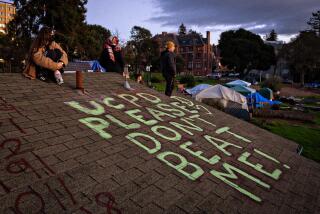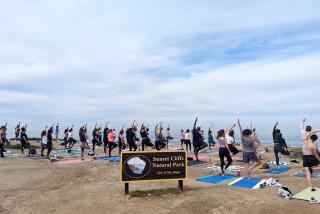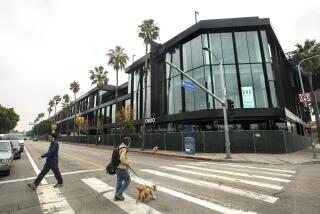Frustrated Park Officials Press Campus to Negotiate : Parklands: State and federal agencies vow to get Soka University for their headquarters. They urge administrators to discuss alternative sites.
- Share via
In a letter vowing to acquire their campus eventually, state and federal park officials have urged the top administrators of a Japanese university in the Santa Monica Mountains to come to a meeting Monday prepared to discuss alternative sites for a proposed expansion.
The park authorities say they have been frustrated for months in their attempts to suggest other locations for the proposed 5,000-student campus of Soka University Los Angeles because the college’s administrators have refused to furnish a list of their needs and desires.
Without a wish list, park officials say it will be all too easy for the university to reject any site offered.
“We are very leery about pointing to sites on a map and then having them say, ‘Oh no, that one doesn’t work, that one doesn’t work, that one doesn’t work,’ ” said Joseph T. Edmiston, executive director of the Santa Monica Mountains Conservancy.
Soka University is nestled in an oak-filled valley in Calabasas, where it provides short-term English courses for rotating groups of about 80 students from the main campus in Tokyo.
In the spring, campus officials announced plans to expand to 5,000 students by the year 2015 and in August disclosed that they had doubled the school’s land holdings to nearly 600 acres. That alarmed the National Park Service and the conservancy, which have long viewed the property as the ideal site for a Santa Monica Mountains park headquarters.
University administrators have said that the Calabasas site meets their needs perfectly and that they have no intention of moving. County property records showed the school may have spent up to $56 million to buy the property.
Soka spokesman Jeff Ourvan said Wednesday that the school’s general director, Hiroshi Okayasu, is coming from Tokyo to attend the meeting with park officials Monday. Okayasu met recently with his board of directors in Japan to discuss a possible land swap with the park agencies and will announce the board’s position on Monday, Ourvan said.
“In the past, his position has been that he’s personally opposed to the idea,” Ourvan said.
In a letter to Okayasu dated Nov. 16, David E. Gackenbach, superintendent of the Santa Monica Mountains National Recreation Area, stated that the park agencies “intend to acquire” the Soka land. Gackenbach also said that the agencies will help the university identify alternative surplus government properties if university administrators provide “specific information on your facility needs.”
In his letter, Gackenbach asked Okayasu for such things as final numbers of students, faculty and staff; a schedule for growth; number of buildable acres needed; whether a site must have existing buildings; ideal distance from facilities such as shopping and public transportation; and water needs.
The park agencies have spent $15,000 to hire an environmental consulting firm to do preliminary studies of the Soka property. Edmiston said that too is an effort to convince university administrators that they should consider taking the land trade proposal seriously.
“If it proves there are some serious problems, then we could . . . say, ‘Here’s some of the problems you guys are going to face. Doesn’t it make sense for us to join hands and go look for alternative sites together?’ ” he said.
In the three months that have followed the college’s disclosure that it had doubled its acreage, the school has conducted a grass-roots information campaign in neighboring areas.
He said the neighbors’ primary concern has been traffic, which the university hopes to address by agreeing to transport students in vans and to restrict campus activity during rush hours.
There also has been an undercurrent of concern about the university’s close ties to a Buddhist offshoot called Soka Gakkai, known in the United States as Nichiren Shoshu of America. The group has been accused by cult-watchers of coercive recruitment techniques and efforts to control its members’ lives.
University officials have tried to minimize their connections with the organization, saying students need not practice Soka Gakkai Buddhism, although they concede that so far most of them do. They say the allegations that it is a dangerous cult are unfounded.
More to Read
Sign up for Essential California
The most important California stories and recommendations in your inbox every morning.
You may occasionally receive promotional content from the Los Angeles Times.













